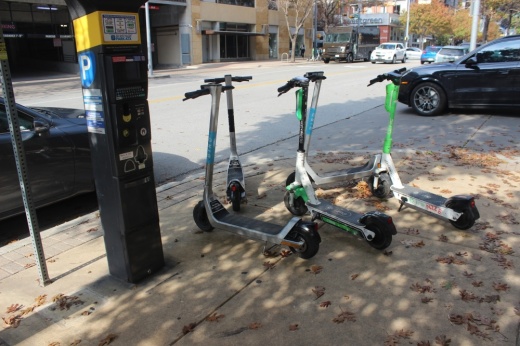The context
Dockless devices like e-scooters first arrived in Austin in early 2018. Today, four companies have more than 10,000 scooters available to riders across town. More than 13.5 million trips covering more than 16.5 million miles have been logged in the past four years.Discussions over micromobility options for both residents and tourists have centered around their use as an alternative transportation and commuting option, and concerns about issues including safety and parking enforcement. Council previously opened the door for scooters on city sidewalks alongside pedestrians and cyclists, and the Austin Transportation Department continues to oversee the technology and where scooters are allowed to ride.
New rules
District 6 Council Member Mackenzie Kelly is bringing a resolution with several directives on those topics to council's March 23 meeting. Council action this month could prompt a slate of reviews of scooter safety, parking, access and enforcement regulation.
Kelly, who used to be a frequent e-scooter rider downtown, said she is pursuing local rule updates to address what she views as a useful but increasingly dangerous travel option. She said one of her own staffer's injuries on a scooter as well as reported crashes and fatalities involving the devices inspired her to draft the resolution.
"It’s something we need to bring awareness to," Kelly said. "If we’re going to have these options in the city, then I believe it’s the city’s responsibility to provide educational outreach and safety measures to ensure the safety of people who choose that as their form of mobility.”
The resolution, if approved, would start several regulatory actions at the city aimed at:
- Requiring users to photograph their parked devices after a ride;
- Controlling how many scooters can park within a geographic area;
- Placing "corral-style" docks in certain locations;
- Setting braking, lighting and suspension design requirements for micromobility devices;
- Reconsidering current safety regulations;
- Studying location-specific speed limits;
- Establishing a fare partnership with Capital Metro for e-scooter trips near transit stops;
- Partnering with a maintenance company to monitor Austin's micromobility network; and
- Rolling out a civic public education campaign covering e-scooter safety, rules and penalties.
An initial draft Kelly's resolution proposed more than doubling rider fees for their first violations, with higher fines for further infractions. The current version instead calls for penalty increases to be decided through stakeholder deliberations.
E-scooter violations are currently Class C misdemeanors punishable by $20 fines for the first violation and $40 for each additional conviction.
Regardless of how changes proceed, Kelly said she wants to make sure individual riders rather than companies pay their way for breaking city rules.
“From my perspective, I think it really needs to be personal responsibility when it comes to fines," she said.
So far, Kelly's measure has been co-sponsored by Mayor Kirk Watson and Council Members Chito Vela and Zo Qadri. If council moves them along, Watson said he thinks the moves will help Austin prioritize e-scooter safety and improve collaboration with micromobility companies.
“Micromobility devices have become a preferred transportation option for a lot of people throughout our city. We want to ensure folks can have a fun and safe experience riding on Austin streets while also keeping our city walkways clear of scooters so everyone else can travel unimpeded," Watson said in a statement.
Austin's four operators—Bird, Lime, Link and Wheels—did not respond to requests for comment about council's review.
Kelly said companies contacted by her office supported the city's exploration of updating local rules. She also asked residents with opinions on e-scooter management to contact her office with their own ideas going forward.
“As with any new technology or new option of mobility, it’s going to take time to work out the best plan or solutions for the community," Kelly said. "I know that for many it’s been frustrating, but if they have any ideas they’d like to bring to us, our door’s open. Because we can’t solve problems without everyone collaborating together.”





